This page lists the current PhD students. For a list of previous years, see Our PhD Graduates.
Atefa Abdallah
Email: a24abdallah@uwaterloo.ca
Atefa Abdallah is a PhD student in English Literature at the University of Waterloo. She holds a BA(Honours) in English Studies from the American University of Science and Technology and an MA in Literary Studies from the University of Waterloo. Her research has been about Arab women and their contributions to literature and society, and the misrepresentations of their roles and contributions. Outside of her academic pursuits, she works in education, freelance writing, and freelance editing. She loves family time, traveling, expanding her book collection, and trying local coffee shops!
Sadia Afrin

Email: s5afrin@uwaterloo.ca
Linkedin: https://www.linkedin.com/in/sadia-afrin-a96567176/
Sadia Afrin is a PhD Candidate under the stream of Rhetoric and Communication Design (RCD) at the Department of English Language and Literature in the University of Waterloo. As a sessional instructor, she teaches in Arts First and English Department.
Sadia sees herself as an energetic and dedicated teacher, researcher, and learner with 10 years of teaching and academic service experiences at the post-secondary education in the U.S., Canada, and Bangladesh. She has her B.A and M.A in English Literature from Bangladesh. Then Sadia did her second master’s degree in the College of Education at the University of Oklahoma, U.S. To be specific, she did M.Ed. majoring in Instructional Leadership and Academic Curriculum with an area of concentration: English Education. She has published a book chapter as the first author titled: “Trajectories of Language, Culture, and Geography in Postcolonial Bangladesh” in the book Handbook of the Changing World Language Map publishedby Springer International Publishing. She has and continues to present in various prestigious conferences such as IWCA, CCCC, and MLA. She is originally from Bangladesh. Her areas of expertise are Post-colonial Literature and Theory, Writing Center studies, Writing studies, Critical Pedagogy, and Academic Writing.
Sadia’s research is invested in Writing Studies and classroom practices of the Western Academia, advocating for liberatory writing practices, creating equity in the learning environment, and challenging colonial power structures. She wants to contribute her knowledge, lived experiences, and creativity in teaching of writing in English, so that multilingual students can use their languages and cultural practices consciously in the Western Academia for their rights to their own languages and rhetorical traditions. Her current focus is on critical writing practices to integrate cultural capitals and knowledge domains of the Hybrid Generation in Canadian universities. Sadia strongly advocates for anti-racist pedagogy and believes that liberatory writing practices can transform boundaries into bridges among various cultures and scholarships.
Maab Al-Rashdan

Email: Malrashd@uwaterloo.ca
Maab Al-Rashdan completed her first MA in English Language from the University of Jordan, her second MA in English Literature from the University of Waterloo and is currently a PhD candidate at the latter. She is the recipient of the UWaterloo’s Graduate Creative Writing Award - Doctorate (2024), Rhetoric Essay Prize - Doctorate (2022), and Beltz Prize in Literature - Doctorate (2021). Maab is also the recipient of the RhetCanada’s Michael Purves-Smith Student Paper Award (2021). Her research interests include Postcolonial Literature and Postcolonial Life Writing, Critical Race Theory (CRT) and Counterstory, Critical Discourse Analysis and Rhetorical Analysis.
Maab cherishes her coffee accompanied by reading and writing and admires watching documentary crime shows in her free time – if such time can be captured in any way… Her motto during her academic journey is: if your studies scare you with their mounting complexity, and infinite amount, scare them back with your passionate motivation, solid determination and ferocious organization! – At the end, the victory is all yours!
Ayesha Altaher

Email: a2altahe@uwaterloo.ca
Ayesha Altaher completed a BA (English Literature) at AAU and her MA (Literary Studies) at UWaterloo. Ayesha is currently a Ph.D. candidate in the department of English Language and Literature at the University of Waterloo. Her secondary field of research is Composition Studies and Pedagogy, and her primary research interest is American Literature. Ayesha is interested in exploring cultural productions, particularly literary texts, by African, Muslim, and Arabic speaking people who were forcefully relocated to the United States (enslaved) or immigrated between the late 1700s and early 1900s, as well as the representations of these groups circulating in North America print culture at the time. Ayesha is interested in how this history challenges what it means to be American.
Becky Anderson

Email: becky.anderson
Twitter: @beckyanderson35
LinkedIn: Becky Anderson
Becky Anderson (she/her) completed a BA (English; French Studies), MA (Literary Studies), and GDip (Cognitive Science) at Waterloo. Becky is the recipient of the Provost Doctoral Entrance Award; a Jack Gray Fellowship; a W.K. Thomas Graduate Scholarship; two Ontario Graduate Scholarships; and a SSHRC Doctoral Fellowship. Becky’s research examines the immersive potential of fantastic ontologies across different forms of media. She’s also concurrently pursuing a Certificate in University Teaching from the Centre for Teaching Excellence to complement her extensive instructional experience with a firm theoretical grounding in the scholarship of teaching and learning.
In addition to her doctoral studies, Becky is a Career Advisor at the Centre for Career Development where she supports folks navigating their path to further education.
Jonathan Baltrusaitis

Email: jbaltrus@uwaterloo.ca
Website: www.jonbaltrusaitis.com
Jonathan Baltrusaitis, BA (Film and Communication/Culture Studies at McGill) and MA (Experimental Digital Media at Waterloo) is a PhD student in the department of English Language and Literature. He comes from a film and television background with a drive to extend documentary storytelling into new media, particularly locative augmented reality. His masters research project “The Civic Monument Reinvented and Extended through Enfranchising Documentary AR” explored how augmented reality can alter the narrative potential of civic spaces, particularly by enfranchising traditionally marginalized voices in the context of civic monuments. Jonathan’s current research continues this exploration of “Space, Time and Story” viewing AR as an opportunity to promote community, belonging, civil discourse and cultural understanding by creating meaningful ‘places’ around us, healing the schism of the dual universes we inhabit (the physical and the digital). To this end he’s exploring the cognitive underpinnings of narrative, the effects of stereoscopy and developing a new locative-documentary grammar. Jonathan received the Graduate Grade Average Award (2017-2018) and he is an enthusiastic teacher.
Mahnoor Bano

Email: mbano@uwaterloo.ca
Mahnoor Bano is a Ph.D. student in the department of English Language and Literature. She completed her BS Hons and MPhil from Pakistan working on Historiography and the female self in Postcolonial Literature.
As a Ph.D. student at the University of Waterloo, Mahnoor’s research interests include postcolonial and post-partition narrative produced by female authors focusing on South Asian and African Literature particularly. Mahnoor is mainly interested in exploring thedivide seen between the literature produced by women and men and the themes it explored in connection to colonization and the partition of the subcontinent. In doing so, the work aims to centralize the marginalized female narrative while tracing the notion of ‘subaltern female self’.
Sarah Casey

Email: smcasey@uwaterloo.ca
Sarah Casey is an English PhD student at the University of Waterloo, with over fifteen years experience as a communications professional in the health, wellness and fitness industry. Her research project, Alternative Risk, focuses on the rhetoric of risk and disinformation, engaging with the study of risk across disciplines (sociology, anthropology, political and management sciences) to understand how risk discourse contributes to social and political polarization. She holds an MA in English (Rhetoric and Communication Design) and a BA in Rhetoric, Media, and Professional Communication, both from the University of Waterloo.
Sarah is an honoured recipient of the Michael Purves-Smith Paper Award from The Canadian Society for the Study of Rhetoric (2024), the UW Beltz PhD Essay Prize (2025 and 2024), the Provost Doctoral Entrance Award for Women (2023) and the UW English Master’s Essay Prize (2023), and has served as a research assistant on multiple federally funded research grants.
In her spare time, Sarah can be found on the squash court, playing for the Waterloo Varsity squash team. In the 2024-25 season, she was named "most improved player" on the women's squad.
Kellie Chouinard

Email: k2chouinard@uwaterloo.ca
Kellie Chouinard (she/they) is a PhD candidate in English. She holds a BA (Hons.) in English, Creative Writing, and History from the University of Windsor, an MA in English and Creative Writing from the University of Calgary, and a graduate certificate in Public Relations from Fanshawe College. Kellie is also an accomplished writer and was awarded a literary creation grant from the Ontario Arts Council (2020) for a novel in progress.
Her SSHRC-funded dissertation research examines young women's transmedia stories about living with and beyond breast cancer.
Alyssa Clarkson

Alyssa Clarkson (she/her) is a PhD student in English Language and Literature at the University of Waterloo. She holds a BA in History from the University of Waterloo and an MA in English Rhetoric and Communication Design from the University of Waterloo. She is completing her PhD on a part-time basis whilst working full-time as a technical writer at a tech company focused on mental health. Her research hopes to examine the rhetoric and discourse surrounding mental health and the care provider - patient relationship, as well as the language used in mental health apps online. Outside of school and work, she enjoys spending time with her two children, reading for fun, fixing her crumbling 130-year-old house, and needlework.
Julia-Rose DiPalo

Email: jdipalo@uwaterloo.ca
Julia-Rose DiPalo is a PhD student in English Language and Literature at the University of Waterloo with a BA Hons (English Literature and History) from Trent University and MA (English and Film Studies) from Wilfrid Laurier University. Julia’s research is based on Canadian Literature with a keen focus on Italian Canadian women’s immigrant narratives, both fiction and non-fiction. Moreover, she is very interested in what these narratives can say about how multiculturalism functions in Canada for both, immigrants, and first-generation Italian Canadians. She takes great pride in telling the stories of her family members, ancestors, and others who underwent a similar plight on their way to Canada.
Michael Domonchuk

Michael Domonchuk is a PhD candidate in the English Language and Literature department. He received a BA (Hons) from Algoma University and an MA in Literature Studies from the University of Waterloo. His research areas focus mainly on Horror and Mystery cinema and Psychoanalysis. Other areas include Gothic and Romantic literature, Mid-20th century American poetry and Detective Fiction.
Haley Down
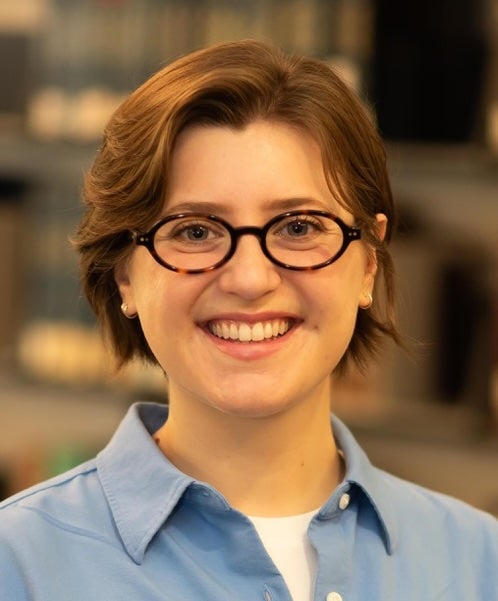
Email: hkdown@uwaterloo.ca
Haley Down (she/her) is a PhD candidate in English with an MA (Wild Writing) from the University of Essex and a BKI (Knowledge Integration) from the University of Waterloo. Her interests meet at the intersection of life writing, food studies, body studies, and gender studies. Haley’s dissertation examines how contemporary women’s food memoirs both resist and reinforce the contradictory cultural narratives surrounding women’s bodies and eating. It explores how the merging of food writing and life writing enables women to challenge and rewrite dominant scripts of embodiment, because while food is commonly associated with nourishment and pleasure, in Western culture it is also a charged site of shame, control, and social regulation.
Haley has been a recipient of the Provost Doctoral Entrance Award for Women. She has completed the New Instructor Foundations program and is currently pursuing the Fundamentals of University Teaching certificate, both through the Centre for Teaching Excellence.
In addition to her doctoral studies, Haley is a writer and poet. She is an assistant editor and contributing writer for Blank Spaces magazine, runs community writing events in Waterloo, and has hosted a weekend writing retreat for beginner poets.
Kavi Duvvoori

Email: kduvvoor@uwaterloo.ca
Bluesky: @geryon.bsky.social
Mastodon: @geryon@kolektiva.social
Website: https://titleduntitled.name/
Two Bios
1. Kavi Duvvoori is a PhD candidate at the University of Waterloo in English, with an MFA from UC Santa Cruz in Digital Arts and New Media and an ScB/AB in Math and Literary Arts from Brown. Their research in computational rhetoric focuses on the impacts of algorithmic mediation, like AI chatbots and social media databases, on communication. It includes an empirical study of large language models (LLMs) abilities to process the form and meaning of rhetorical figures and linguistic constructions; a study of identity and embodiment in algorithmic voice synthesis in relation to the theories of the elocutionary movement; and a project drawing on queer media studies and the metaphor of fungal networks to identify tactics that defend plurality, participation, and fluidity in algorithmically mediated language. They are an editor for the Taper magazine of computational writing, and have shared digital literary art in Taper, Ensemble Park, and the Michigan Quarterly Review.
2. Kavi Duvvoori is a writer (and other things) in Kitchener, Ontario, on the Haldimand tract, working in CUPE local 5524. Their interests include experimental and constrained literature, birds, borders, speculative fiction (Delaney! Le Guin! Lem! Butler!), lists, linguistics, labour, the limits of language, math, worldbuilding, infrastructures, redwoods, the search for ways of living that reject hierarchy and domination, sautéing, maps, and ambiguity. They have published a couple small pieces in online publications and fear the enclosure of language itself.
Carolyn Eckert
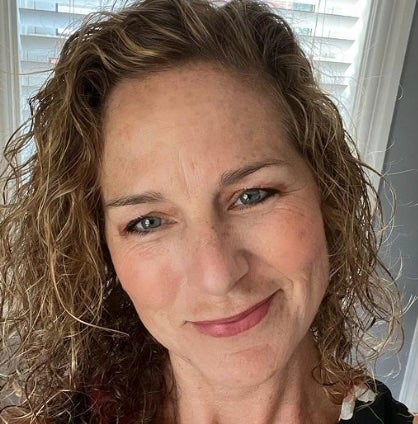
Email: ceckert@uwaterloo.ca
Carolyn Eckert is a PhD Candidate in English at the University of Waterloo, specializing in the Rhetoric of Science, Technology, and Medicine (RSTM). With over twenty years of experience in communications, public relations, and marketing, she brings a practitioner’s insight to her academic work. She holds both an MA in English (Experimental Digital Media) and a BA in English from the University of Waterloo.
Carolyn’s research investigates how trust is shaped through public communication during health crises. Focusing on Canada’s history of epidemics and pandemics, her dissertation analyzes COVID-19 news discourse by exploring: (1) who produces pandemic-related messaging (e.g., journalists, public health officials, political leaders, citizen media); (2) what rhetorical strategies are used to inform, persuade, or mobilize publics; and (3) how these strategies affect public compliance, resistance, and trust. Her work integrates rhetorical theory, discourse analysis, and public health communication to examine the persuasive dimensions of pandemic, vaccine, and protest rhetoric.
She is the recipient of the 2024 UW English Rhetoric Essay Award and the 2021 Provost Doctoral Entrance Award for Women, and has served as a research assistant on several federally funded projects. Carolyn also teaches communications and marketing at Conestoga College and Humber College's School of Business. Within the graduate community, she has served as Treasurer for SAGE (Student Association of Graduates in English) and as the Arts Representative for the Graduate Studies Endowment Fund (GSEF).
Omnia Elsakran

Email: omnia.elsakran@uwaterloo.ca
Omnia Elsakran is a Ph.D. candidate in English. She holds a BA in English Language and Literature (with a Minor in Translation Studies) and an MA in Teaching English to Speakers of Other Languages (TESOL). Her research examines information warfare, media studies, and critical discourse analysis, with a particular focus on contemporary propaganda tools.
She is the recipient of the Provost Doctoral Entrance Award and has completed the Fundamentals of University Teaching Program at the Centre for Teaching Excellence. She is also currently involved in the Certificate in University Teaching (CUT) Program, further advancing her professional development in evidence-based teaching strategies. With more than 10 years of teaching experience, she brings extensive instructional expertise that complements her academic and professional training.
Laila Emara
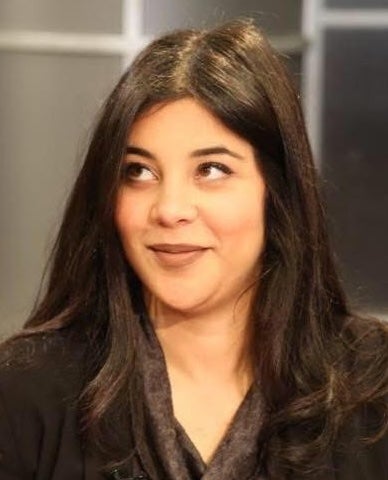
Email: lemara@uwaterloo.ca
Laila Emara is a PhD student in English Literature at the University of Waterloo. She holds a BA in Communication and Media Arts, with minors in Business Administration and Political Science, from the American University in Cairo, where she also completed an MA in Television and Digital Journalism. Her research interests explore the challenges of science communication and underscore its importance in an era of rapid technological advancement. Drawing on her background in media, she has worked on video projects that translate complex scientific concepts into engaging and accessible content for the public, bridging her academic interests with practical applications.
Giuseppe Femia

Email: gwfemia@uwaterloo.ca
Twitter: @_foolsbait
Giuseppe Femia is an English PhD Candidate at the University of Waterloo. He previously completed a double major for his Bachelor of Arts, in English, Rhetoric, Media, and Professional Communication & Honours Arts and Business, as well as a Master of Arts, in Rhetoric and Communication Design, both at Waterloo.
Giuseppe’s current research in game studies, media studies, queer studies, disability studies, and performance studies observes different types of gaming media and the appeal it has to its audience. He previously presented his work on queer reparative play and Dungeons & Dragons at the Transformative Play Initiative Seminar in Visby, Sweden, and then had it published as a peer-reviewed article in the International Journal of Role-Playing. His current work observes disability representation and disabling mechanics in TTRPG narratives and systems.
Giuseppe is now partnering up with other scholars researching the intersection of disability studies and game studies to broaden the horizons of the growing field.
Alexander Fleck

Email: a3fleck@uwaterloo.ca
Alex Fleck, B.A. (Waterloo), M.A. (Waterloo), is a second-year English PhD student examining virtual reality hardware and software through a media archeology and philosophy of technology lens. This research subject coincides with Alex’s other research into interfaces, FPGA (clone) videogame consoles, various histories of computer technology, the remastering/adaptation of old videogames, modding and piracy/ownership, and game design.
Colleen Foster
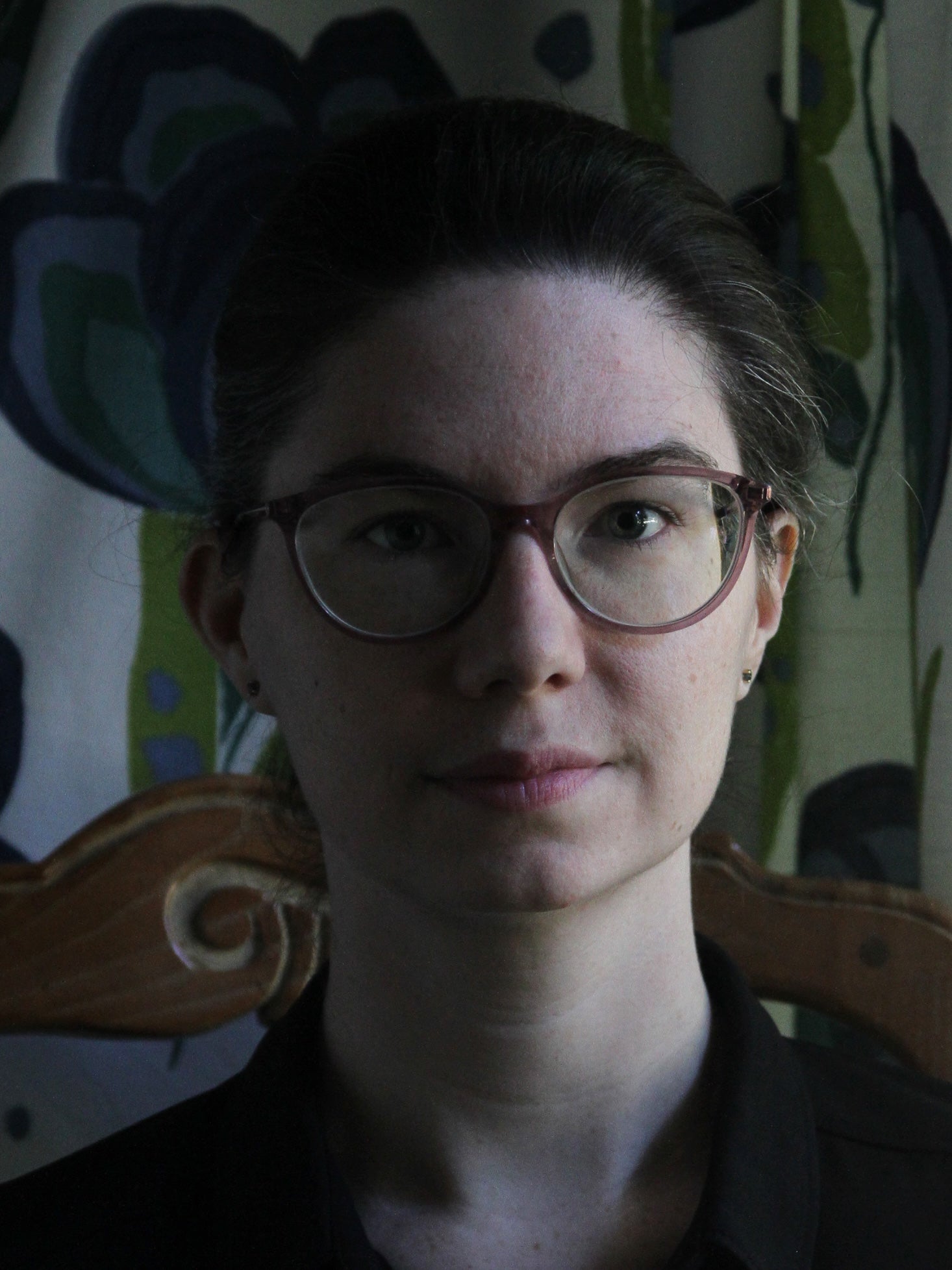
Email: cnfoster@uwaterloo.ca
Colleen Foster is an English PhD student at the University of Waterloo. She earned an MA in English Literature from Western University, a GradCert with Honours in Creative Book Publishing from Humber College, and a BA with Distinction in English Language & Literature and Italian Studies from Western University. Colleen is a recipient of the Provost’s Doctoral Entrance Award for Women (2024).
Colleen’s dissertation project considers the relationship between loneliness and environmental sensitivity in 19th- and 20th-century American literature. Her project is motivated by two contemporary global phenomena: climate change and the COVID-19 pandemic. Colleen’s research is supported by the President’s Graduate Scholarship and the Ontario Graduate Scholarship (OGS).
An executive member of the Student Association for Graduates in English (SAGE), Colleen is currently the Graduate Student Association (GSA) Rep and was previously the Conferencing Rep. She also serves on the Graduate Student Caucus of the Association of Canadian College and University Teachers of English (ACCUTE) as the representative for UWaterloo’s English graduate students. In addition to her PhD, Colleen is working towards completion of the Professional Skills Foundations and Fundamentals of University Teaching programs.
Samantha Fowler
Fowler

Email: samantha.fowler@uwaterloo.ca
LinkedIn: Samantha Fowler
Samantha Fowler (she/her) completed a BSc (Psychology; Biology Minor) at the University of Waterloo and a MScCom (Science Communication) at Laurentian University. She graduated as Valedictorian of the Faculty of Science University of Waterloo (2019). Samantha is a PhD student in English, where her research will examine the rhetoric of community building and digital advocacy for disabled persons in STEM (science, technology, engineering, and mathematics). Her career experiences focus on equity, diversity, and inclusion within science communication and post-secondary education.
In addition to her doctoral studies, Samantha is the Disability Inclusion Coordinator at the University of Waterloo, where she supports institutional accessibility and disability community-building initiatives. She is a Co-Executive Director of The Disabled CoLab.
Aleksander Franiczek

Aleksander Franiczek completed his BA and MA in English Literature at Western University and is currently a PhD candidate for the University of Waterloo’s English program. His doctoral research synthesizes perspectives from game studies, phenomenology, narrative theory, and critical design to consider how a player's sense of immersion in the world of a videogame can provide a means towards self-reflection through creative engagements both during and outside gameplay. As a member of both the Games Institute and Critical Media Lab, he is interested in exploring critical and alternative approaches to analyzing gameplay experiences that focalizes how personal meaning is generated in the meeting between player and program. He also helps other game enthusiasts publish their work as the Section Head of Essays at First Person Scholar, where he also features on the journal’s podcast.
Kasturi Ghosh

Email: kasturi.ghosh1@uwaterloo.ca
Kasturi Ghosh is a PhD candidate in the Department of English Language and Literature. Her research is supported by a SSHRC Doctoral Fellowship, several Ontario Graduate Scholarships and UW President’s Graduate Scholarships, the Provost Doctoral Entrance Award for Women, and other institutional and departmental scholarships and awards. Focusing on the portrayal of vampires and other monstrous entities created by Anne Rice, Poppy Z. Brite, and Charlaine Harris, her research studies contemporary Gothic Fiction of the American South, reading it as a body of fiction that reflects both the homogeneous identity forced upon the region and the uncanny re-emergence of its global past and its diverse population. This approach complements psychoanalytical approaches by tracing the changing socio-political imaginary of the American South and its influence on the Southern Gothic, which, by the end of the 20th century, came to challenge the region’s supposedly uniform cultural and political identities. She has presented her research at international conferences, including the IGA, IAMAS, NEPCA, SFU-IGA, and the Louisville Conference on Literature and Culture.
Prior to coming to UW for her PhD in 2020, Kasturi served as an Assistant Professor of English for eight years in her home country, India. She holds an MPhil and an MA in English from Jadavpur University, Kolkata, another MA in Women’s and Gender Studies from IGNOU, New Delhi, and a BA Honours in English from Loreto College, Kolkata, India. She has published papers in peer-reviewed journals. Her interests are Gothic Studies, Gender Studies, Popular Literature and Culture, and Adaptation Studies.
Vanya Gnaniah

LinkedIn: Vanya Gnaiah
Vanya Rachel Gnaiah is a PhD Student whose research interests include Animal Studies, Posthumanism, Food Culture and Media Theory. She previously completed an Integrated MA in English Studies with a minor in Development Studies at the Indian Institute of Technology, Madras. She was also the recipient of the Erasmus Mundus scholarship and was selected for an exchange program to Aarhus University, Denmark. She currently holds the Exceptional Doctoral Student Scholarship and her PhD research examines the conditions that make the animal killable in the abattoir and the biopolitical consequences of technological innovations centered around lab-grown meat and plant-based proteins.
Thomas Hanson

Thomas Hanson is a Ph. D. student in English. He studies rhetorical theory and the rhetoric of science. He wants to investigate the relationship between ancient scientific paradigms and recent scientific thinking. His work is funded by the Social Sciences and Humanities Research Council of Canada.
Melika Hashemi
Email: melika.hashemi@uwaterloo.ca
Mélika S. Hashemi is an artist-researcher and writer with over ten years experience working in arts and education, both within (and beyond) screens and institutional walls. Her PhD research defines a "digital spirituality" using critical data literacies, media archaeological methods and metamodernist critique.
Mélika holds a M.Ed. in Curriculum & Pedagogy from the University of Toronto, and an Hons. B.A. in Fine Arts from the University of Waterloo. She has served as a reviewer for tba: Journal of Art, Media, and Visual Culture, and as research assistant on multiple federally funded research grants. She is presently a member of the Public Art Advisory Committee (PAAC) for the Region of Waterloo.
Melissa Johnson

Email: mnpjohns@uwaterloo.ca
Melissa Johnson is a PhD student in the Department of English Language and Literature. Her dissertation examines how the rhetorical history of hysteria has informed and continues to inform current societal and medical perceptions of contemporary women with illness and/or disability. Melissa graduated with distinction from Western University with a BA (Hons.) in English and a Minor in Sociology. She received her MA in Interdisciplinary Studies from the University of Northern British Columbia where she examined the negative social and health ramifications of disseminating, legitimating, and perpetuating pathologizing discursive representations of Indigenous peoples in Canadian media. Melissa is the recipient of the Provost Doctoral Entrance Award (2018/2019). She is also an Executive Member of the Student Association for Graduates in English (SAGE) serving as Equity Liaison (2019/2020). She is committed to investigating inequities and oppression, violence, discourse and power, and especially, ableism.
Jin Sol Kim

Jin Sol Kim is a PhD candidate in English with a BA (Hons. English Literature and Rhetoric, Minor Speech Communication) and MA (Rhetoric and Communication Design) from the University of Waterloo. Her research focusses on digital media, visual culture, and postcolonial/critical race theory to consider the ways in which [digital] photography shapes and negotiates racial ideologies.
Jin Sol is also a recipient of the Ontario Graduate Scholarship and is part of the SSHRC-funded project "(Re)Marked Tattoos", which studies commemorative Holocaust tattoos as new sites of public Holocaust memory.
Alicia Latimer

Alicia Latimer (she/her) completed a BA (English Literature), MA (English, Rhetoric and Communication Design), and is currently a PhD candidate at the University of Waterloo. Alicia is the recipient of the Provost Doctoral Entrance Award for Women (2020). Alicia’s research examines the representation of disability in Young Adult literature and how readers respond to this representation in online spaces. She has completed the Fundamentals of University Teaching program and is currently pursuing a Certificate in University Teaching from the Centre for Teaching Excellence.
Christopher Lawrence

Email:clawerence@uwaterloo.ca
During my undergraduate studies at Carleton I double majored in English Literature and Linguistics, and played a lot of video games. During my Masters in English Literature at Carleton I specialized in science fiction and dystopia, and played a lot of video games. At some point I realized that I ought to combine these interests.
Video games are everywhere now: in books, in film, on your TV, on your phone, in the classroom, in the workplace. I want to make sense of their impact on our lives. People today spend as much time playing games as they might have spent reading books fifty years ago. How does that restructure our cognition? McKenzie Wark summarizes that “Games are no longer a pastime, outside or alongside of life. They are now the very form of life, and death, and time itself." So "play" isn't just about play anymore. Play has become work.
I believe that it's essential to understand how we are using what we learn in games to approach challenges in our real lives. To plead ignorance is to allow external forces to co-opt those influences and manipulate them in their favour. Nick Dyer-Witheford and Grieg de Peuter warn that "video games are a paradigmatic media of empire." To this I ask: what is our alternative? How can we take this cognitive capital back from the gamified office and leverage it positively? Big questions. I can't answer them on my own. That's why I'm here at the University of Waterloo.
Rency Luan

Email: r2luan@uwaterloo.ca
Rency Luan (she/her) is a PhD candidate in English with a BA (Hons. English; Rhetoric) from the University of Waterloo and MA (Rhetoric) from Carnegie Mellon University. Rency’s research examines the intersection between mental health, immigration, and race to explore how mental health discourse is circulated linguistically, culturally, and globally.
Rency is the recipient of the Ontario Graduate Scholarship and Jack Gray Fellowship. She is an executive member of SAGE and also an advisor for The Garden of Rhetorica at Soochow University. Her favourite rhetorical figure is epizeuxis, and her favourite Care Bear is Cheer Bear.
Kem-Laurin Lubin

Email: k4lubin@uwaterloo.ca
Kem-Laurin Lubin is a Ph.D. candidate at the University of Waterloo, where she focuses on Artificial Intelligence (AI) biases and how their inherent discursivity informs the material effect on the lived experience of people, particularly the marginalized. Her research is predicated on the idea that technology is nothing short of a digital colony, mathematizing and amplifying the analogic biases and that an understanding of how AI models work can better inform how they make decisions, void of bias but also to further hermeneutic methods of assessing AI models as advanced textual forms. She is also the 2021-2022 OGS/QEII-GSST Scholarship (2021-2022) as well as President’s Graduate Scholarship (PGS) 2021. Kem-Laurin completed an Honours B.A. at the University of Ottawa and an M.A in the Rhetoric and Professional Writing stream at the University of Waterloo.
Christopher Martin

Chris Martin is a PhD student at the University of Waterloo, building on the concepts learned there during his Masters in English Rhetoric and Communication Design. Currently, he is spending his time researching the formation of ideological communities on YouTube, focusing on the interactions between the rhetorical techniques employed by popular content creators and the platform’s algorithmically driven content recommendation systems. When not testing the limits of his sanity by gazing into the abyss of the internet, Chris writes and edits screenplays, and even engages in the occasional acting role.
Anna McWebb
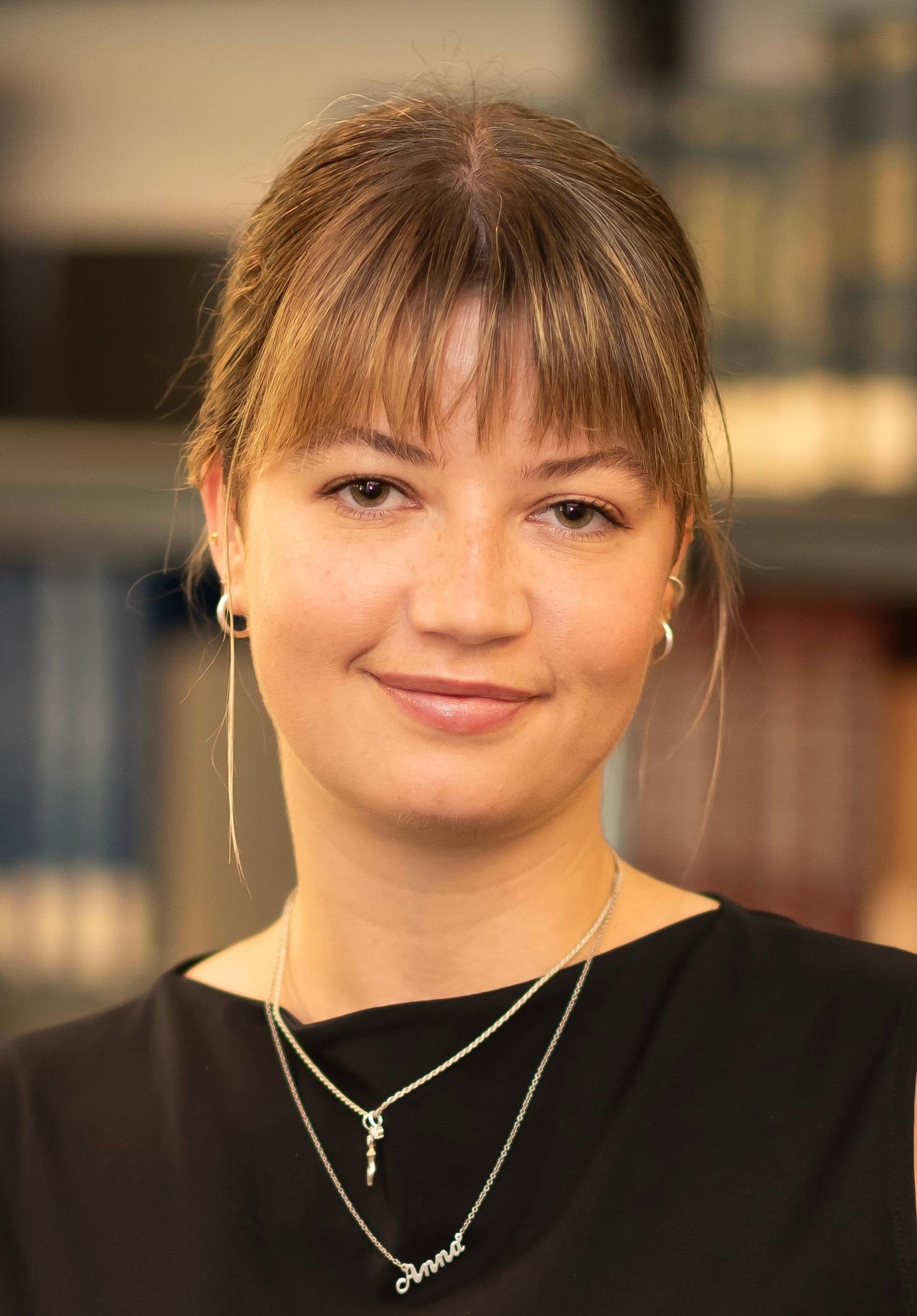
Email: anna.mcwebb@uwaterloo.ca
Anna McWebb (she/her) is a PhD candidate (ABD) in English with a BA (Creative Industries) from Toronto Metropolitan University, and an MA (Art History and Visual Culture) from the University of Guelph. Her research focuses on the relationship between queer and feminist digital culture and political rhetorics that perpetuate misogyny and queerphobia, primarily on social media.
Anna is the recipient of the Ontario Graduate Scholarship (2025/2026), and aside from dissertation work, holds the role of the Managing Editor for (un)Disturbed: A Journal of Feminist Voices, a UW-based digital publication.
Diana Moreno Ojeda

LinkedIn: Diana Moreno Ojeda
Diana Moreno Ojeda, BA (Art History and Theory; Philosophy minor, Los Andes University), MA (English Language Teaching, University of Tabriz), and MA (Rhetoric and Communication Design, University of Waterloo) is a PhD candidate at the University of Waterloo.
Her research work is anchored at the intersection of Attitude, Artificial Intelligence (AI), and Cognitive Narratology. More specifically, Diana looks at how authors deploy patterns of Attitude in science fiction to present their evaluation of AI to their readers. Attitudinal appraisal is ultimately a device for the positioning of discussions on the cultural value of our technological artifacts and their construction; but, also, for the exploration of our current definitions of intelligence, reason, and cognition.
Diana is also Associate Editor of Essays for First Person Scholar, and she enjoys cooperative table-top games just as much as reading Science and Speculative Fiction.
Dakota Pinheiro

Email: ddpinhei@uwaterloo.ca
Twitter: @DakotaPinheiro
Dakota Pinheiro (he/him) is a PhD Candidate and Sessional Instructor in the Department of English Language and Literature and a Graduate Educational Developer (GED) for the Centre for Teaching Excellence. He completed his BA in Honours English Literature at the University of Waterloo and his MA in English at the University of Toronto. He has also completed the Fundamentals of University Teaching (FUT) certificate and is currently completing his Certificate in University Teaching (CUT) from the Centre for Teaching Excellence. Dakota has served as Treasurer and Co-President of the Student Association for Graduates in English (SAGE), as a voting member on the English Chair succession committee, as a chair for the graduate student stage of 2022’s English faculty interviews, and as an Editor and Section Head of Commentaries at First Person Scholar (FPS).
Dakota’s dissertation project critically examines socially-conscious works of contemporary American literature and their representations of labour protest, in/justice, and intersectional solidarity. His project, divided into three sections, examines representations of labour in corporate fiction, superhero satire, and in the COVID-19 pandemic’s literary corpus. His work employs an interdisciplinary approach, integrating economic theory, critical labour studies, and literary theory (to name a few) into his investigation of the social implications of labour and equity advocacies in some of America’s most recent literary works. Dakota presently has forthcoming articles being published by First Person Scholar and English Studies in Canada and has presented his research at several prestigious venues including MLA, ACCUTE, CAAS, NeMLA, and CASDW.
Dakota has been the recipient of a number of merit-based scholarships including a Viola Whitney Pratt Memorial Scholarship, two Ontario Graduate Scholarships (OGS), a Jack Gray Graduate Fellowship, an Arts Graduate Enhancement Scholarship, UW President’s Scholarship, the Lea-Vogel Nimmo Graduate Professionalization Award, and a W.K. Thomas Graduate Scholarship. He has also been the recipient of his cohort’s Grade Average Award and Betty G. Headley Senior Essay Award during his undergraduate studies.”
Alison Purnell

Email: ampurnel@uwaterloo.ca
Alison Purnell is a PhD student in English Language and Literature at the University of Waterloo. She has a BA in Religious Studies from the University of Waterloo, an MA in Medieval Studies from the University of Toronto, and studied at the Centre for Medieval Studies at the University of York (UK) for several years. Her interdisciplinary work explores the social discourses and rhetoric around mental disability in 14th and 15th century England through the lens of critical disability theory. Alison's translation of her manuscript source material was included in the Medieval Disability Sourcebook published by Punctum Press (2020) and she tweets about disability history and amusing medieval shenanigans at @14thCdisability.
Toben Racicot

Email: tsracico@uwaterloo.ca
Toben Racicot's research focuses on role-playing games; loot systems, character creation, adaptation, and digital magic circles. His dissertation examines affordances and constraints of RPGs to suggest revised mechanics to lessen the barrier of entry for gamers. Loot should be more findable, character creation include fewer long-range choices, and more viable options for progression through combat, social interaction, and exploration.
Toben is the co-host and producer of The Games Institute Podcast, interviewing student and faculty researchers from the Games Institute and The University of Waterloo. He’s the recipient of the English Department's TA Award for Teaching Excellence (2020-2021). He also designs tabletop games for the Environments of Change project headed by Dr. Steven Bednarski.
In addition to academic work, Toben creates comic books as a writer and letterer. He writes Crown & Anchor and Pilgrim’s Dirge. He letters Beastlands (Dark Horse Comics), Juniper (Scoot!), and Sidequest.
Supervisor: Dr. Neil Randall
Jenn Rickert
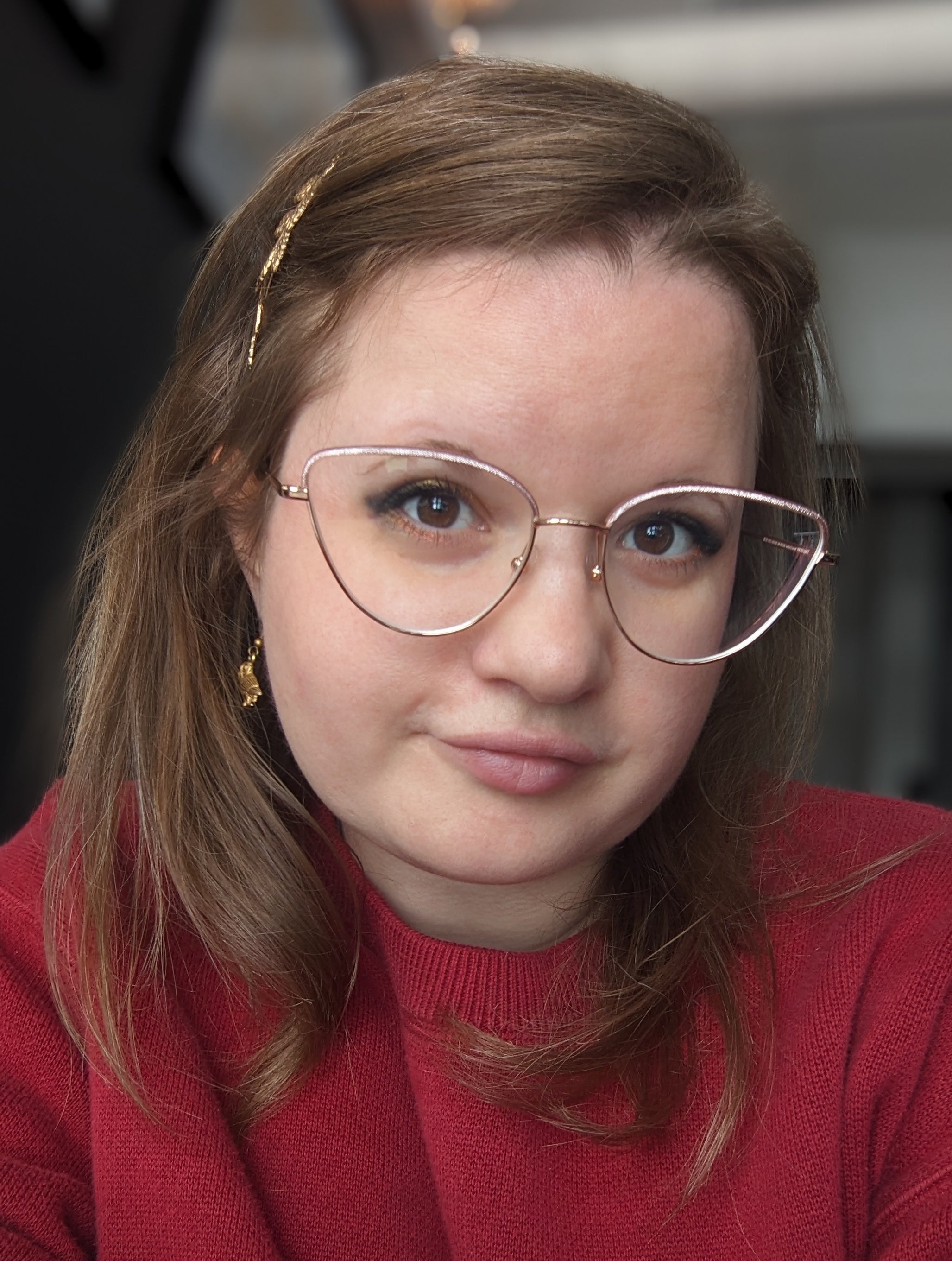
Email: jrickert@uwaterloo.ca
LinkedIn: @jennrickert
Jenn Rickert is an interdisciplinary-trained academic (BA Hons Classical History & Anthropology; MA Public Issues Anthropology) specializing in the interconnectivity of people, technology, and culture. She is a PhD candidate actively writing her dissertation, which focuses on video game mechanics (and game mechanics more broadly) and how they are fundamental in creating, enhancing, or giving meaning to players' interactions within game worlds. She is developing methodology for interpreting these complex systems of meaning-making-interaction, in hopes of building not only more inclusive and positive gaming experiences, but also in affecting video game communities as well. In addition to her primary research goals, she also is particularly interested in accessible, inclusive, and applicable research, bridging research and industry, as well as other socially constructed aspects of video games (e.g. cheating & modding, emotion, etc.)
Christopher Rogers

Email: christopher.rogers@uwaterloo.ca
Christopher Rogers is a PhD student in English. He completed his BA in Political Science at the University of Toronto and his MA in Experimental Digital Media at Waterloo. His research explores the rhetoric of watery spaces – shores, riverbanks, beaches – as places where the vibrancy of the material world comes into focus. Chris’ work asks what hopeful paths forward we can imagine, observe, and create when we pause and consider our entanglements with the nonhuman world.
Jerika Sanderson

Email: j9sander@uwaterloo.ca
LinkedIn: Jerika Sanderson
Jerika Sanderson is a PhD candidate at the University of Waterloo. She completed her MA (English) and her BSc (Biological Sciences and English) at Brock University. Her doctoral research is funded by a Joseph-Armand Bombardier Canada Graduate Scholarship (2021-2024) and investigates representations of biotechnology and biomedicine in 21st-century science fiction and science journalism. In general, she is interested in the intersections of biotechnology, biomedicine, environmental issues, and discourse, and her research engages with critical posthumanism and critical medical humanities. She is the recipient of the Provost Doctoral Entrance Award for Women (2019), the Waterloo Special Graduate Student Entrance Award (2019), the Lea Vogel-Nimmo English Graduate Professionalization Award (2020), and the Rhetoric Essay Prize (2021).
Sabrina Sgandurra

Email: sasgandu@uwaterloo.ca
Sabrina Alicia Sgandurra (HBA Toronto Metropolitan University, MA University of Waterloo) is a PhD student specializing in games studies. As a resident of the Games Institute and as a student, her research focuses on the intersection of oral storytelling traditions in the act of streaming story-focused video games. Sabrina has won two OGS awards, has presented her research at distinguished conferences such as DiGRA 2023, PCA 2021 & 2022, MLA 2022, CGSA 2021, and ACCUTE 2022, and has published her research in Simulation & Gaming. In addition to her role as a student, she is also currently working at First Person Scholar as the Editor-in-Chief.
Mohsina Shafqat Ali

Email: mshafqatali@uwaterloo.ca
Mohsina Shafqat Ali completed her BA (High Distinction) from the University of Toronto, MA from York University, and World Literature Diploma from York University. She is currently a PhD Candidate in the Department of English Language and Literature at the University of Waterloo. Her research interests include South Asian Women’s Life Writing, Postcolonial Studies, Discourse Analysis, Diaspora Studies, Translation Studies, and World Literature. Her MRP responded to the paucity of life writing texts by South Asian women writers who have not been analyzed in the discourse of Postcolonial Studies, Diaspora Studies, and Translation Studies. In order to close the gap of this understudied field, in her dissertation, she plans to continue her investigation of women’s Diasporic Intersubjectivity by examining South Asian Women’s Memoirs from a Transcolonial perspective.
Besides writing for her dissertation, Mohsina likes to expand her teaching skills by attending the courses provided by the University of Waterloo. She has tutored students from Accessibility at the University of Toronto, and was a TA and a GA at the University of Waterloo. She is currently a GI at the University of Waterloo. She has also served as the Co-President for SAGE (Student Association for Graduate in English) at the University of Waterloo. Besides that, she reads for the Puritan Magazine. In her free time (if she has any), she likes to set up her telescope in her backyard to gaze at the moon.
Mojdeh Shahidi
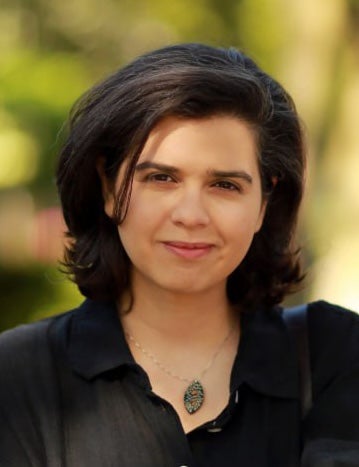
Email: mshahidi@uwaterloo.ca
Mojdeh Shahidi (she/her) completed her undergraduate studies with a Joint Honours degree in English literature and Classics where her love of literature and languages could meet. After a few years spent teaching, she returned to graduate studies at the University of Waterloo for an MA in Classical studies where her research looked at Classical mythology and Latin poetry, with a special focus on women’s voices and gendered representations in epic.
She has a wide array of interests in English literary studies ranging from 19th century British women’s writing to poetry and Classical Reception. She is particularly interested in the applications of feminist thought and postcolonial critical theories to the texts she loves.
Mojdeh also has a keen interest in teaching and has completed the Certificate of University Teaching program at Waterloo’s Centre for Teaching Excellence where she has worked as a workshop facilitator in the past.
Elizaveta Shatalova

Email: eshatalo@uwaterloo.ca
Elizaveta (Liz) Shatalova is a PhD candidate in English Language and Literature at University of Waterloo, Canada. Liz attended the Faculty of Philology for her Bachelor’s Degree at the Lomonosov Moscow State University and received her Master of Arts Degree from the University of Leeds in England, where she specialized in Modern and Contemporary Literature. Her current dissertation thesis, titled “The Post-Literary Public Sphere and the Digital Assembled Culture: Towards the Structural Transformation of Criticism”, theorizes the post-literary public sphere in the digital media context, examining the tension between institutionalized practices of criticism and public communication online. The genre of a video essay online is her primary focus. She specifically interrogates the digital communicative forms vis-a-vis their hybridized adoption (and countercultural rejection) of the legitimized norms and conventions of scholarly criticism, inclusive of the critical methods of cultural studies. Her research interests include new media studies, popular culture, the Frankfurt School, and communication theory.
Rebecca Sherlock
Profile forthcoming
Humaira Shoaib

Email: h3shoaib@uwaterloo.ca
Humaira Shoaib, B.A. (University of the Punjab), M.A. (University of the Punjab), is a PhD candidate in the Department of English Language and Literature. Humaira’s research focuses on Canadian Muslim fiction and its engagement with the “Bad Muslim” stereotype through a Critical Muslim Studies lens. Her research is enriched with ideas from post-colonial studies, Diaspora Studies, and social justice rhetoric.
Since 2021, Humaira has been involved as a research assistant for a collaborative research project between the Coalition of Muslims Women-KW and Researchers from the University of Waterloo. She is also volunteering to organize a Muslim Writers Festival to be held in the US in the year 2025. Humaira has been an influential member of the university community, taking on leadership roles that have made a significant impact. For SAGE (Student Association for Graduates in English), which is the departmental GSA, she has served as the Equity Liaison (2021-2022), President (2022-2023), and the current Co-President (2023-2024). In 2024-25, she is employed as a Teaching Assistant Workshop Facilitator with the Center for Teaching Excellence.
At Waterloo, her research is supported by the Ontario Graduate Scholarship (OGS), and she is the grateful recipient of numerous awards, including the Lea Vogel-Nimmo English Graduate Professionalization Award, the TA Award for Excellence in Teaching, and the W.K. Thomas Graduate Scholarship. Her research work was also nominated for the Beltz Essay Prize in Literature. Humaira likes to spend her free time with her family of three boys and a loving husband.
Juliana Stacey
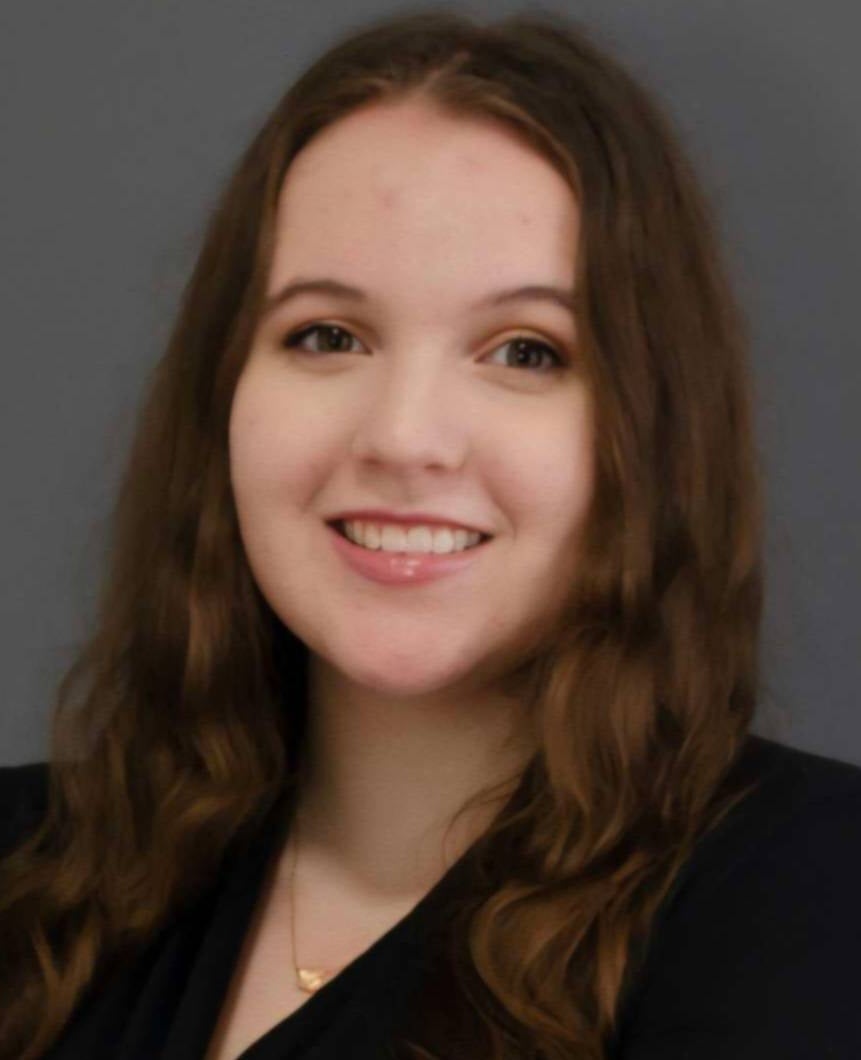
Email: jstacey@uwaterloo.ca
Juliana Stacey (she/her) is a Ph.D. student at the University of Waterloo. She holds an Honours Bachelor of Arts (Professional Writing and Communication, English) and a Master of Arts (English) from the University of Toronto. She is primarily interested in how women’s health narratives – especially those of women’s reproductive illness – are portrayed through social media. She is also excited to be the First Year Ph.D. Representative for SAGE for the 2025-2026 school year. Outside of school, Juliana is a board game enthusiast, an amateur crocheter, and loves spending time with her three dogs.
Kirk Sullivan
Profile forthcoming.
Fiona Thompson
Fiona Thompson

Email: fthompson@uwaterloo.ca
Fiona Thompson (she/her) completed a BSc in Chemistry (Honours) at the University of Victoria, a Certificate in Dance Education at the Royal Academy of Dance, and an MSc in Chemistry (Quantum Information) at the University of Waterloo. Fiona's scientific research background is in two-dimensional superconductivity. Her doctoral research focuses on the rhetoric of science, especially as it relates to best practices for communicating about emergent quantum technologies. She also works at the Institute for Quantum Computing in the role of Scientific Outreach Officer.
Fiona is a recipient of the Ontario Graduate Scholarship (2025), the English Rhetoric Essay Award: PhD (2025), the David Johnston Award for Scientific Outreach (2024), and the Provost Doctoral Entrance Award for Women (2024). She has over a decade of public speaking and instructional experience, including extensive outreach work with children, university students, and professionals. She is the former Editor-in-Chief of Acta Victoriana, the oldest university publication in Canada. When she’s not working, you can find Fiona browsing a vintage store, dancing at a ballet class or punk show, or just hanging out at home with her cat. The latter is, by far, the most likely.
Valerie Uher

Email: vuher@uwaterloo.ca
Twitter: @valerieuher
LinkedIN: Valerie Uher
Valerie Uher, B.A. (University of Toronto), M.A. (Toronto Metropolitan University), is a PhD candidate in the department of English Language and Literature. Valerie’s research focusses on Canadian fiction (20th and 21st century) portraying labour unrest in the context of Canada’s resource economy. Her dissertation addresses the myriad ways worker subjectivity is imagined in this literature, and how those representations are impacted by shifting notions of race, ability and gender in settler-colonial Canada. Valerie’s research interests include labour studies, critical theory, modernism, and energy humanities. She is a co-editor and managing editor of The Johns Hopkins Guide to Critical and Cultural Theory and her work has been published in ESC: English Studies in Canada, Canadian Literature and The Routledge Encyclopedia of Modernism. She has book chapters forthcoming in 2 edited volumes (McGill-Queens University Press & West Virginia University Press) and presents her research regularly, domestically and internationally. Valerie is the proud recipient of the 2023 Barbara-Godard Prize for best paper by an emerging scholar, awarded by The Association for Canadian and Québec Literatures (ALCQ-ACQL).
As an active member of the university, Valerie has served her colleagues in a variety of ways: as amember of the S.A.G.E., Valerie served as Member-at-Large and G.S.A councillor for English; as a volunteer for the UW chapter of the Fight for Fifteen and Fairness (now Justice for Workers), she led an advocacy group that supports students in their fight for improved working conditions. Valerie is a proud organizer and advocate for the campaign to unionize sessionals, TAs and RAs at the university (OUW). At Waterloo, Valerie’s research is supported by a SSHRC Doctoral Fellowship and an Ontario Graduate Scholarship (OGS), and she is the grateful recipient of numerous awards including the Lea Vogel-Nimmo English Graduate Professionalization Award; Arts Senate Award; and the TA Award for Excellence in Teaching, amongst others.
Michael Veenstra
Michael Veenstra

Email: mdveenstra@uwaterloo.ca
Michael Veenstra (he/him) completed his BA in English & Cultural Studies (McMaster) and his MA in Literary Studies (Waterloo). His research looks at the narrative value and techniques of “lore” and its impacts on culture through adaptations across media. Michael’s Master’s major research project - “Power and Madness in Fantasy Fiction” - examines how fantasy engages with disability and appears in The Journal of the Fantastic in the Arts 35.1. Michael is also passionate about teaching, and is pursuing his Certificate in University Teaching from the Centre for Teaching Excellence. He lives in Hamilton with his wife and pets.
Julie Veitch

Email: jveitch@uwaterloo.ca
Julie Veitch is a PhD candidate and Sessional Instructor in the English Language and Literature department at the University of Waterloo. She completed a BA (Honours English, Minor History) at Toronto Metropolitan University and MA (English Language and Literature) at Brock University. Her research focuses on modern children's and YA horror-mystery books, movies, and video games. She is especially interested in exploring character agency, depictions of monstrosity, and the lingering legacy of the Gothic within these narratives.
In 2024, Julie presented a paper at the MLA Conference, titled “Staring Death in the Face: The Gothic Working-Through of Loss and Trauma in A Series of Unfortunate Events”. She also presented a paper at the 2025 International Conference on Games and Narrative, which was based on an article she published with First Person Scholar: “Interpretation as Interaction and the Horror of Limited Agency in Until Dawn”.
Julie has served as an editor for First Person Scholar and a reader for the literary magazine The Ex-Puritan since 2021,and she has been the Internal Communications Officer for the Student Association for Graduates in English (SAGE) since Fall 2023.
Karen Ward
Email: k3ward@uwaterloo.ca
Profile forthcoming.
Andrew Weiler

Email: a4weiler@uwaterloo.ca
Andrew Weiler is a PhD candidate in English Language and Literature at the University of Waterloo. He is the recipient of the Ontario Graduate Scholarship for his work on novelist and poet Charlotte Brontë. His MA thesis, Charlotte Brontë’s Spiritual Vision, was published in 2019.
His dissertation research on Somatic Literacies includes embodied learning, reading, and writing, cognitive literary studies, and composition pedagogies. These diverse academic interests stem from professional experience and prior education. Teaching a variety of subjects from grades K-12, and first-year writing courses at multiple universities, Andrew has worked with the Ojibwa people of Shoal Lake 40 Indigenous Reserve (near Winnipeg), the Chinook School Division in southwest Saskatchewan, and various schools southern Ontario. He graduated from the University of Western Ontario with a Bachelor of Education and from the University of Windsor with an MA Thesis in English Literature.
Andrew instructed ENGL 109 Academic Writing and Somatic Literacies at the University of Waterloo in 2022 and 2023.
He has been published with the Brontë Studies Journal (Taylor and Francis): “An Orphan’s Dissent: Charlotte Brontë’s Spiritual Vision in Jane Eyre” (2022).
Blaze Welling
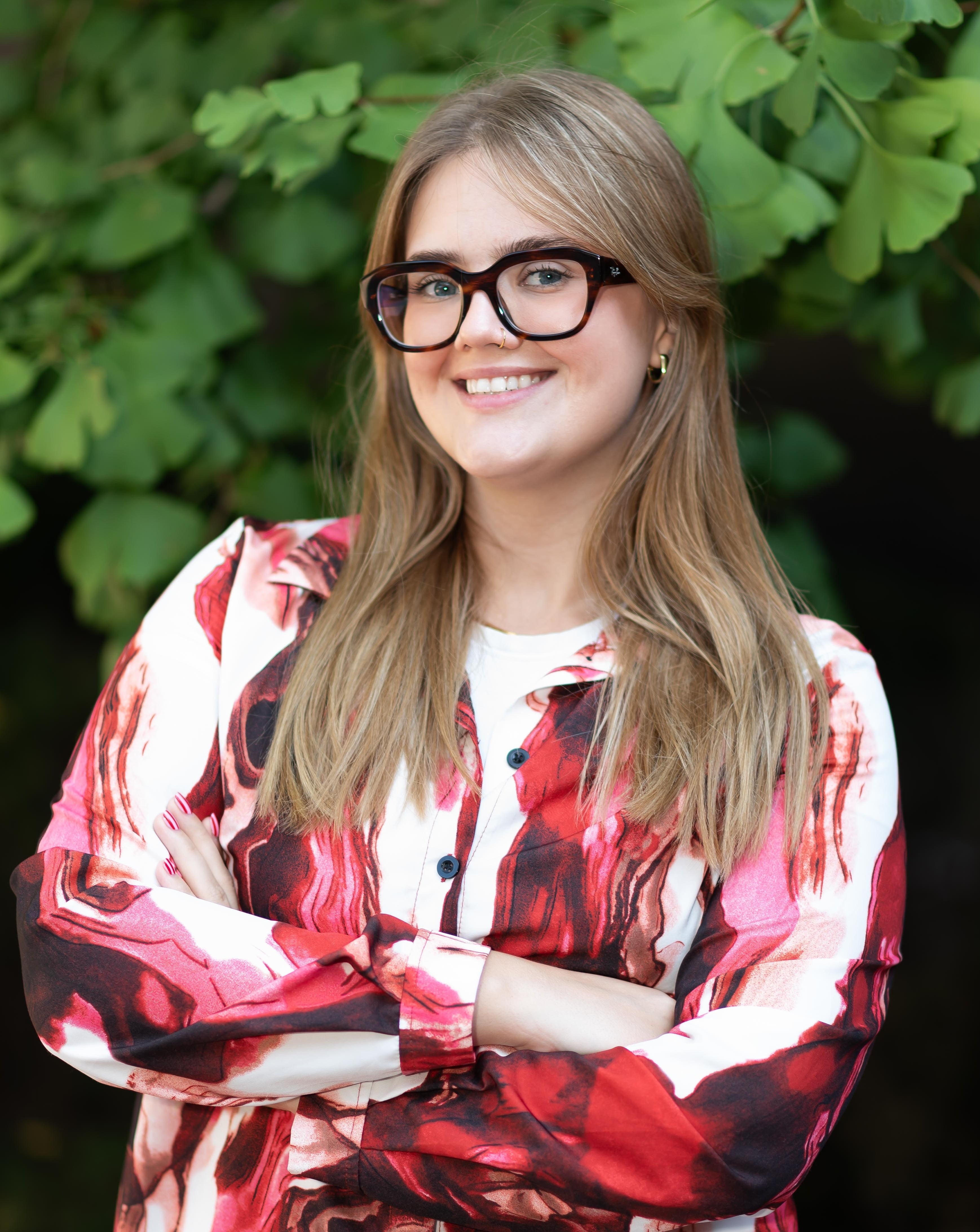
Email: bsjwelling@uwaterloo.ca
LinkedIn: Blaze Welling
Blaze Welling (she/her) completed her BA (Hons., English), MA (English and Film Studies) at Wilfrid Laurier University, and is now a Ph.D. candidate in English Language and Literature at the University of Waterloo. Blaze’s research focuses on the entanglement of rhetoric, technology, and colonial power in shaping Canadian and Indigenous identities during the nineteenth century. Her dissertation project will consider these entanglements within the broader structures of settler colonialism, showing how technologies of communication and transportation simultaneously enabled Canadian expansion and constrained Métis sovereignty. As a settler scholar, she maintains a respectful and considerate methodology, deeply committed to using her privilege to uplift Indigenous voices.
In addition to her doctoral studies, Blaze is an OGS recipient and the president of the Student Association for Graduates in English (SAGE).
Sonia Zafar

Email: sa2zafar@uwaterloo.ca
Sonia Zafar is a PhD student in English Literary Studies. Her research interests include Feminist and Post-colonial Research Studies. She did her MS from Lahore College for Women University, Pakistan, in English Literature. She has also worked at the University of Engineering and Technology Lahore, Pakistan as a Lecturer under the Higher Education Commission of Pakistan. Her previous research at the University of Waterloo focused on the South Asian Muslims as Model Minorities within the diaspora fiction of the South Asian Anglophone writers. She is particularly interested in exploring the experiences of postcolonial diaspora and depicting the identity deconstructions due to their displacements.